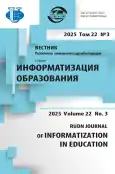Pedagogical works in social media as a resource for teacher professional development
- Authors: Pustylnik Y.Y.1
-
Affiliations:
- Federal Institute for the Development of Vocational Education and Traning
- Issue: Vol 22, No 3 (2025)
- Pages: 304-314
- Section: EVOLUTION OF TEACHING AND LEARNING THROUGH TECHNOLOGY
- URL: https://journal-vniispk.ru/2312-8631/article/view/321325
- DOI: https://doi.org/10.22363/2312-8631-2025-22-3-304-314
- EDN: https://elibrary.ru/QTVJLS
- ID: 321325
Cite item
Full Text
Abstract
Problem statement. The increasing engagement of educators in sharing authorgenerated content on social media necessitates an examination of emerging paradigms for disseminating educational knowledge. This study investigates the conditions for teachers’ professional development through the publication of original teaching materials. Methodology. This study investigates the conditions for teachers’ professional development through the publication of original teaching materials. Employing a mixed-methods content analysis of 40 primary school teachers’ accounts on VK and Telegram (2022-2024), the research explores the characteristics of professional learning communities centered around teacher-authors. The methodological basis of the research is the ontological and acmeological approaches. Results . Social media have become the most important communication channel for teachers and a platform for the voluntary association of teachers in professional online communities for the distribution of original pedagogical works. The author describes the monetization framework and legal aspects of publishing educational materials, the results of the analysis of the main distribution models, including: crowdfunding for the development of educational content; access to resource libraries by subscription; digital licensing of pedagogical materials; premium content in closed communities. It is noteworthy that significant content remains in the public domain. Conclusion . The study concludes that evolving knowledge dissemination ecosystems - particularly through controlled commercialization - enhance digital literacy acquisition, pedagogical innovation capacity, professional identity as content creators.
About the authors
Yulia Yu. Pustylnik
Federal Institute for the Development of Vocational Education and Traning
Author for correspondence.
Email: y.pustylnik@internet.ru
ORCID iD: 0000-0001-6082-2725
SPIN-code: 8167-9567
Candidate of Pedagogical Sciences, Lead Specialist of the Activity Coordination Department
25 Bolshaya Ordynka St, bldg 1, Moscow, 119017, Russian FederationReferences
- Noskova TN, Pavlova TB, Tumaleva EA, Kulikova SS, Yakovleva OV, Ustyugova TA. Social media and Educational Practices. St. Petersburg: Herzen University Publ.; 2021. (In Russ.) EDN: RBNHMP
- Grinshkun VV, Suvorova TN. Teacher training in the conditions of digital transformation of the education system. Lomonosov Pedagogical Education Journal. 2024;22(1):95–110. (In Russ.) https://doi.org/10.55959/LPEJ-24-05 EDN BCERXQ
- Ilyasov DF, Burov KS, Selivanova EA, Sevryukova AA. Generalization and dissemination of effective experience as a way of development of teacher’s pedagogical skills. Scientific Support of a System of Advanced Training. 2024;(1):5–28. (In Russ.) EDN: VISSFQ
- Derkach AA. (ed.) Acmeology. 2nd ed. Moscow: RANEPA Publ.; 2006. (In Russ.) EDN: SUEVUL
- Mikidenko NL, Storozheva SP. Adoption of innovations as a factor in the development of the digital educational environment. Pedagogy. 2023;87(10):18–24. (In Russ.) EDN: UTFWTR
- Dodueva SZh. Monitoring of effectiveness of distribution of pedagogues’ methodical works in the Internet. Otechestvennaya i zarubezhnaya pedagogika = Domestic and Foreign Pedag ogy. 2019;1(3):83–97. (In Russ.) https://doi.org/10.24411/2224-0772-201910019 EDN: DLYWIB
- Kohler S, Dietrich TCl. Potentials and limitations of educational videos on YouTube for science communication. Frontiers in Communication. 2021;6:2–19. https://doi.org/10.3389/fcomm.2021.581302 EDN: MUUHSO
- Kuzmina NV, Dubrovina LI, Inozemtseva VE. The author’s system of teacher activity in the light of social synergetics and acmeology of quality. Mordovian University Bulletin. 2003;13(3–4):55–61. (In Russ.) EDN: TESYXL
- Nikolaeva MA, Avdyukova AE. Teachers’ blogs on social media as a tool for the prevention of emotional burnout and an ooortunity to develop competencies. Pedagogical Journal of Bashkortostan. 2021;(4):104–117. (In Russ.) https://doi.org/10.21510/18173292-2021-94-4-104-117 EDN: REDULD
- Pel NA. Participation teachers in professional learning communities as a factor of professional growth. Scientific Support of a System of Advanced Training. 2024;(1):115– 124. (In Russ.) EDN: EIJZRD
- Patarakin ED. Studying and modeling collaborative activities in online communities. Moscow: Moscow Pedagogical State University Publ.; 2024. (In Russ.) EDN: OUJXYB
- Shelton Ch. “You have to teach to your personality”: caring, sharing and teaching with technology. Australasian Journal of Educational Technology. 2018;34(4):92–106. https://doi.org/10.14742/ajet.3557
- Vasileva OYu, Basyuk VS, Ivanova SV. Mentoring: yesterday, today and tomorrow. Peda gogy. 2023;87(8):5–17. (In Russ.) EDN: QKSBCW
- Minyurova SA. Psychological characteristics of teacher self-development in the profession. Pedagogical Education in Russia. 2024;(3):36–46. (In Russ.) EDN: BXIVIF
- Aparicio-Molina C, Sepulveda-López F. Teacher professional development: perspectives from a research experience with teachers. Revista Electrónic@ Educare. 2023;27(2):1–16. https://doi.org/10.15359/ree.27-2.15870
- Kataeva EV. NFT technology as a copyright protection tool. International Journal of Humanities and Natural Sciences. 2022;12(1):147–150. (In Russ.) https://doi.org/10.24412/2500-1000-2022-12-1-147-150 EDN: KEDPLX
- Ponomarchenko AE. Blockchain technology in of copyright. Legal Concept. 2021;20(4):148–152. (In Russ.) https://doi.org/10.15688/lc.jvolsu.2021.4.20 EDN: KDNJBQ
Supplementary files









